 By Ray Rivers
By Ray Rivers
November 8, 2014
BURLINGTON, ON
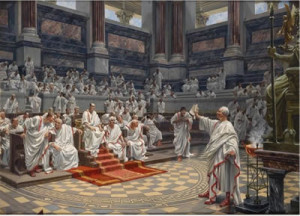
The Roman Senate – not what we have in Burlington.
The political party is an essential component of representative democracy. The Athenian (Greek) model of direct democracy allowed everyone to get into the act, but that is an impossibility in todays busy, modern, and heavily populated world. So we are stuck with political parties, warts and all.
Parties make it easier for the voter to choose, particularly in a bi-cameral system such as the US has, with Republicans or Democrats the only choice on election day. Americans, tired of Obama’s leadership, swept his party’s representatives out of office and replaced them with Republicans in this week’s congressional elections. And in almost all cases voters were electing the party, not the person.
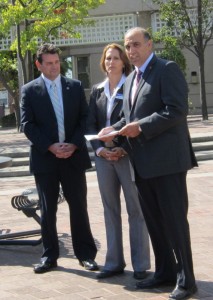
Councillors Rick Craven and Marianne Meed Ward are both known Liberals but there is precious little they agree on.
Parties also make it easier for the candidate to present him/her self and to identify issues. The party system simplifies choice, since formal party platforms offer voters a clear choice among competing philosophies of governance. This may be one of the reasons why voter turnout is consistently higher in provincial and federal elections than for municipal elections where parties are banned (in Ontario).
Of course, municipal issues are pretty mundane stuff. Dealing with zoning, stop signs, speed limits and development proposals isn’t as sexy as sending CF-18’s into action over Iraq, or ramming an oil pipeline through environmentally sensitive land. Still these local issues matter to residents concerned with transit, development charges, local taxes and urban sprawl.
But I’ve never understood voting for school trustees? Isn’t education policy delivered and delivered by the Province? Wouldn’t the administration of schools and children’s transportation be best left to the local authorities (cities) where they are situated? And isn’t it already confusing enough for voters to have to deal with choosing a mayor and ward councillor, in addition to potential referenda questions. Perhaps internet voting will help facilitate this process.
Parties do a lot of the legwork for the voting public by screening candidates, training them in fulfilling their duties and disciplining them when they screw-up. For example, Trudeau has just removed two MP’s from his Liberal caucus over accusations of sexual harassment. Unlike individual candidates, the party candidate not only represents him/herself but everyone else connected to the party – their ideals, principles and policies. Rob Ford would never have lasted as long as he did were he representing a respectable political party.
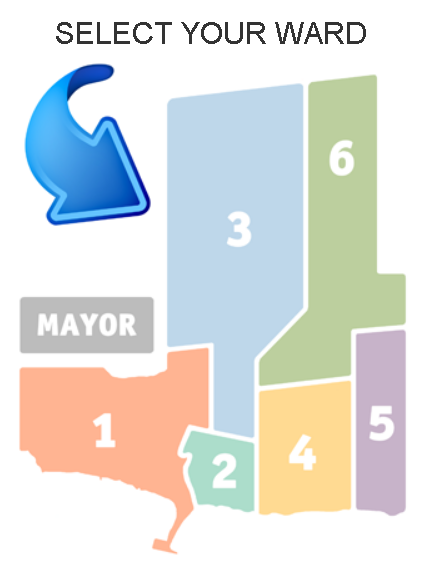
New candidates in every ward, many that were very credible – but Burlington voters decided they were happy with what they had – well at least just over 30% were happy and actually voted.
To look at last week’s municipal election results one couldn’t be blamed for thinking they’d been voting in Russia or Syria, if only because the results are mostly a foregone conclusion. Well, except for Toronto where the Ford brothers did make for a colourful election. Incumbents normally have a huge advantage running as individuals because their names have been made familiar in the media and they have no official daily opposition to challenge them.
In addition, new candidates face an uphill battle, particularly if the electoral field is huge as it was for Toronto’s mayor, with over 50 contestants. Then there are all those local issues which can leave newbies vulnerable in candidates’ debates, depending on their exposure. Funding and organizing a campaign can also serve as huge barriers for a potential new candidate.
Jack Layton attempted to bring party politics into Toronto many years ago with his Metro NDP. Lacking political infrastructure, like an Elections Toronto, his venture ended up working out a lot like Ford Nation – it didn’t. Montreal and Vancouver have had successful, working political parties, which for the most part are independent of those at the senior levels. One wonders how Ontario’s best known perpetual incumbents, Mississauga’s Hazel McCallion and Milton’s Gordon Krantz, the queen and king of urban sprawl, would have fared in a partisan environment. At least the development issue might have received more public airing.
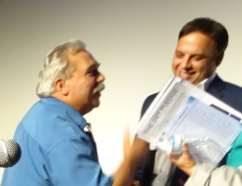
Angelo Bentivegna and Jivan Sanghera in discussion after the ward debate
An important consideration is how to keep good people wanting to compete for municipal offices, though the odds seem stacked against them. Not that long ago municipal elections were held every two years, then it got bumped to three, and now it is four. The longer the period between elections, the less the chance for new people to get involved. And then Ontario experienced a spate of municipal consolidations through forced amalgamations in the 1990’s which ended up reducing council positions and, thus, opportunities.
In Burlington all those who spent their time and money to challenge the existing council ended up going home disappointed this year. That might still have been the case were there political parties for voters to choose from, rather than just somebody’s name. We’ll just hope that these people who committed themselves to public service don’t all give up even though it’ll be four years before they can try again.
 Ray Rivers writes weekly on both federal and provincial politics, applying his more than 25 years as a federal bureaucrat to his thinking. Rivers was a candidate for provincial office in Burlington where he ran against Cam Jackson in 1995, the year Mike Harris and the Common Sense Revolution swept the province.
Ray Rivers writes weekly on both federal and provincial politics, applying his more than 25 years as a federal bureaucrat to his thinking. Rivers was a candidate for provincial office in Burlington where he ran against Cam Jackson in 1995, the year Mike Harris and the Common Sense Revolution swept the province.
Direct Democracy More Parties Duties of Trusties Even More Parties Montreal Parties
Toronto Parties Trustees More Toronto Parties Councillor Duties
Hurricane Hazel E-Voting Metro NDP Vancouver Parties














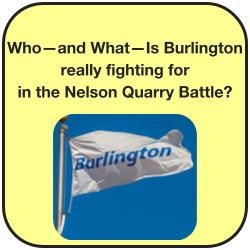

Being a member of a political party tells me little about the candidate. It does tell me something about the candidate’s boss – and that boss is looking out for its own interests, not mine.
I’d prefer to have party structure not influencing municipal services. Imagine if one or two wards voted for one party, while the majority of wards voted in another – we’d see politicians voting for things that are damaging to the city just to make their “opponents” look bad. Good civic government demands co-operation, and the party structure provides incentives for legislators not to co-operate.
Partisanship, even at the best of times sacrifices the public good and the long-term view required to make decisions about infrastructure, in order to put the political party’s immediate interests first. Add to that the potential conflict with the senior levels of government if they happen to be of a different colour (or even with the election aims of the same party) and you have a recipe for even lower effectiveness at the municipal level.
As soon as a candidate has an affiliation with a political party, a whole lot of preconclusions are made. If you listen carefully to your municipal candidate, ask the questions, you can pretty much conclude where on the political spectrum they situate themselves, but you are still free to choose the person you think can do the important work for you close to home, rather than someone who is held to party policy in Toronto or Ottawa. As for the tough job of trying to unseat the incumbent; been there, done that, even have the t-shirt, buttons and signs to prove it, so you will see me again in four years.
Although some who run for municipal election may have a stronger affiliation for some political party over another, I don’t support it being formalized as candidate X is a Conservative etc. Let the local candidates discuss issues specific to that city and not some larger political platform. I think that is closer to democracy. There so much control over anyone running for a provincial or federal position. There is far too much forcing politicians to adhere to a party line.
We do not need such non sense to pave our roads, build our cultural infrastructure and get any provincial politician to listen to Burlington’s needs rather than ….nope your are a Conservative and the province is controlled by Liberals…lol
At least with political party association a person can glean if that person’s political philosophy matches up with their own, without even having to know too much about the local issues.